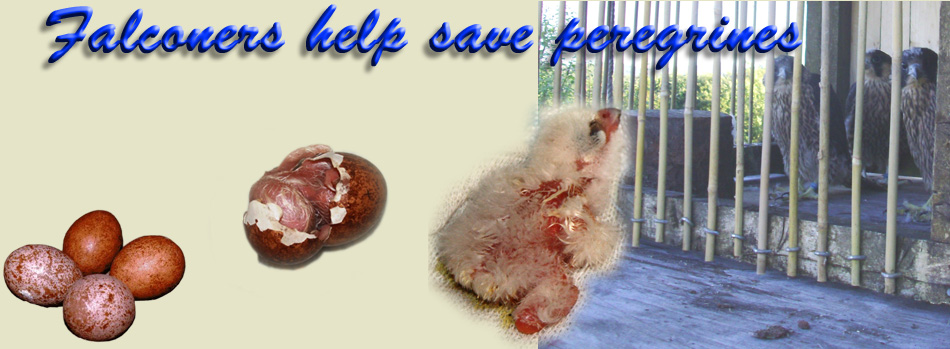When Jeffrey Lendrum was given thirty months in prison for stealing and attempting to smuggle fourteen peregrine falcon eggs from Birmingham to Dubai in May, the falconry community applauded. Such actions are abhorrent to us all. But the fate of these eggs has been only lightly covered by the mainstream media which has focused on the crime and the supposed worth of the contraband.
When faced with so many eggs the authorities were at a loss as to know what to do. Luckily the 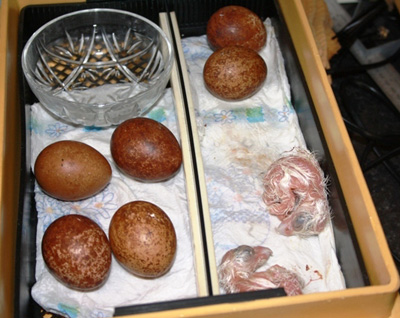 investigating officer, Andy McWilliam from the National Wildlife Crime Unit (NWCU) knew of a goshawk breeder in Birmingham. Lee Featherstone was quick to help and put the eggs in his incubators. Twelve were fertile and eleven hatched successfully and closed rings were fitted in accordance with Animal Health instructions. But what to do next? investigating officer, Andy McWilliam from the National Wildlife Crime Unit (NWCU) knew of a goshawk breeder in Birmingham. Lee Featherstone was quick to help and put the eggs in his incubators. Twelve were fertile and eleven hatched successfully and closed rings were fitted in accordance with Animal Health instructions. But what to do next?
You cannot just raise them and release them at will. If they had continued to be hand-reared they would have become imprinted on Lee and could never have been returned to the wild. The Hawk Board, which represents falconry in the UK, looked at the problem and devised a number of solutions that satisfied both Animal Health and NWCU. Those that could were taken by RSPB and placed in nests but time was limited – it takes a matter of days for a young falcon to become imprinted. So others had to be 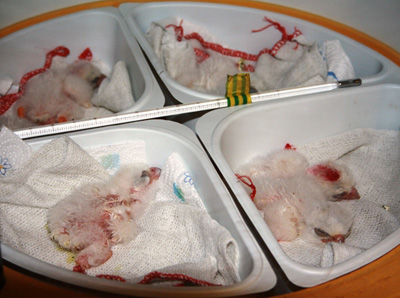 reared by foster parents. Falcon Mews is a CITES registered raptor-breeding centre in Yorkshire and has pairs of peregrines that would do the job. So owners Peter Gill and Richard Hill volunteered. Whilst this was happening further nest sites were found and more young were released. But the remaining four needed to be put back sooner rather than later. reared by foster parents. Falcon Mews is a CITES registered raptor-breeding centre in Yorkshire and has pairs of peregrines that would do the job. So owners Peter Gill and Richard Hill volunteered. Whilst this was happening further nest sites were found and more young were released. But the remaining four needed to be put back sooner rather than later.
Hacking is a centuries old falconry tradition. Young falcons are placed in man-made nests and fed adlib whilst they learn to fly and eventually hunt. When the watching falconer notes that they have started to feed themselves he would catch them up and train them for his use. In our case that would be the moment when we had done our job and the remaining four falcons would have been ‘hacked back’ and left to fend for themselves. The chosen hack site was at a secret location known only to a few falconers and the young peregrines were collected from Falcon Mews by 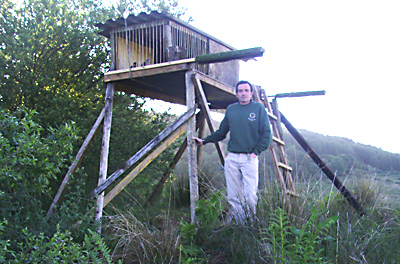 Dale Johnson, Chairman of the Yorkshire Hawking Club, and driven to Scotland. Dale Johnson, Chairman of the Yorkshire Hawking Club, and driven to Scotland.
Without this endless succession of willing volunteers, the authorities would have been looking at fourteen dead-in-shell eggs, but as it happened eleven young peregrines are now in the wild and thriving exactly as they would have done before Lendrum stole them. All the falconers involved can be justly proud of what they have achieved, because no one else could have done it.
Dale Johnson and willing volunteers take the young peregrines for release into the wild using the age old falconry technique of hacking back.
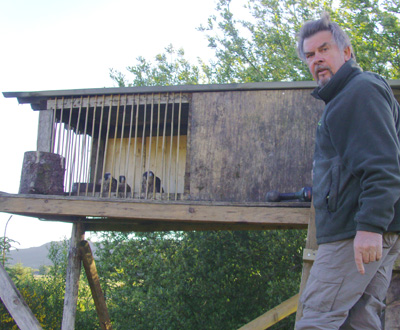
images are copyright: Lee Featherstone and Dale Johnson.

|
